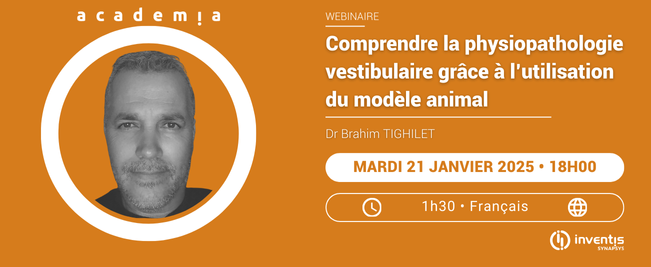Comprendre la physiopathologie vestibulaire grâce à l’utilisation du modèle animal
 18:00 (CET)
18:00 (CET)



Comprendre la physiopathologie vestibulaire grâce à l’utilisation du modèle animal

Dans cette conférence je parlerai de mon travail de recherche qui consiste depuis plusieurs années à utiliser le modèle animal de lésion de l’appareil vestibulaire dans l’objectif de mieux comprendre les mécanismes responsables à la fois de l’expression du syndrome vestibulaire mais également ceux impliqués dans la restauration de la fonction vestibulaire. En effet, une atteinte du système vestibulaire induit un « syndrome vestibulaire » composé de déficits moteurs tels qu’une instabilité posturale, un déséquilibre locomoteur, une incapacité à stabiliser son regard lors d’un mouvement de la tête mais également de déficits perceptifs, cognitifs et émotionnels tels qu’une altération du schéma corporel, une désorientation du corps dans son espace associée à une forte anxiété. Avec le temps, ces symptômes s’amenuisent avec une cinétique variable selon les espèces, ce processus est connu dans le champ des Neurosciences sous le nom de la « Compensation Vestibulaire ». L’avantage de ce modèle est qu’il nous permet de révéler avec précision les mécanismes biologiques endogènes sélectionnés par le cerveau pour restaurer la fonction vestibulaire altérée par la lésion. La connaissance de ces mécanismes est fondamentale car elle nous donne la possibilité de les moduler par des approches pharmacologiques et/ou réductionnelles dans l’objectif d’aider le cerveau à s’auto réparer et retrouver une fonctionnalité optimale dans les meilleurs délais.

Brahim Tighilet
Brahim Tighilet is a lecturer and researcher at Aix Marseille University, working at the Centre de Recherche en Psychologie et Neuroscience (CRPN UMR 7077 - AMU & CNRS). He is head of the ‘VESTIMED’ physiology and therapy of vestibular disorders team. His research focuses on the pathophysiology of vestibular disorders. The main aim of his work is to improve our understanding of the endogenous neuroplasticity mechanisms responsible both for the expression of vestibular pathology and for those involved in the recovery of balance function after vestibular damage. His most original recent discovery concerns the first evidence of post-injury vestibular neurogenesis (birth of new neurons in the vestibular nuclei) in an experimental model of vestibular pathology and its beneficial role in restoring static and dynamic balance functions. Over the last few years, he has developed an ongoing partnership with the pharmaceutical industry in the field of the neuropharmacology of vertigo. In particular, his work has enabled him to demonstrate for the first time the mechanisms and sites of action of betahistine (Tighilet et al., 2002) and the active principle of Tanganil (Tighilet et al., 2015). All his work has made him a recognised expert in the field of vestibular compensation and the pharmacology of vertigo. He has given many seminars and invited lectures, as well as numerous papers at international and national congresses. He has published over 70 articles in various scientific journals and book chapters. He co-founded a start-up company to promote his academic work. This led to the filing of patents with the CNRS for pharmacological compounds to combat vertigo.

 Ir al inicio
Ir al inicio

 International - English
International - English Italia - Italiano
Italia - Italiano France - Français
France - Français USA - English
USA - English